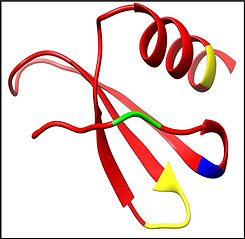
Adit Ben-Baruch lab
Laboratory for Research of Inflammatory/Immune Modules in Malignancy
Research interests
Breast cancer is a leading cause of death for women in the Western world. The battle against breast cancer has been challenged by the fact that, generally, each component is studied meticulously, but singly. Too little attention is paid to the interactions between the tumor cells and their intimate microenvironment, consisting of various cells and soluble factors. Such cross-talks often promote breast cancer development and aggravate disease course; thus, identifying such interactions is crucial for the design
of improved therapeutic modalities that are the most effective for the treatment of each individual patient, and thus are "custom-tailored".
The aim of our studies is to provide better and personalized therapeutic modalities in breast cancer. Our approach is based on understanding the way the inflammatory/immune microenvironment affects pro-malignancy functions in breast tumor cells and its impact on tumor-stroma interactions.

By identifying regulatory immune/inflammation-based cellular and molecular interactomes in breast cancer, the mechanisms involved and their clinical implications, the Ben-Baruch lab aims at advancing the path towards the design of novel therapeutics that are tailored to different breast cancer subtypes. The lab focuses on the immune/inflammatory milieu of breast tumors and aims to identify the mechanisms mediating the intimate interactions taking place between the acquired and inflammatory arms of the immune system in regulating breast cancer progression. In parallel, the lab investigates the way inflammatory mechanisms interact with stromal elements, and the way they regulate metabolism, the generation of cancer stem cells and metastasis-promoting activities in different subtypes of disease in breast cancer.
To provide direct and meaningful insights to these immune/inflammatory aspects of breast cancer progression, the lab uses an integrative research program: studies progress from analysis of molecular mechanisms, through high resolution analyses of tumor cells and animal model systems, to validation of key findings at the clinically-relevant level by using patient datasets and biopsies.
So far, our studies have provided important information on the roles of inflammation and immunity in malignancy in general and in breast cancer in particular. We were among the first to describe the pivotal contribution of inflammatory chemokines to breast cancer development and progression. By identifying the regulatory inflammation/immune-based networks, we will be able to propose novel therapeutics based on simultaneous targeting of several molecules, in a manner tailored to each patient.
Research projects
In brief, in the Ben-Baruch lab we ask:

How do TNFα-based networks affect acquired immune activities in breast cancer, and what are the clinical implications of such interactions?
The inflammatory cytokine Tumor Necrosis Factor alpha (TNFa) is associated with advanced disease course in breast cancer patients and has been recently identified as a causative tumor-promoting factor in this disease (based on our studies and others). Our findings indicate that under specific circumstances TNFa turns into a strong pro-metastatic factor, suggesting that therapies against TNFa should be introduced to the clinical regimen rather than the use of TNFa as an anti-tumor cytotoxic agent, as has been proposed until not so long ago.
Our current studies determine the mechanisms by which TNFa activates metastatic traits in breast tumor cells, and the way it collaborates with other pro-tumoral fators of the tumor microenvironment. The findings that will be obtained in this research will pin-point the molecular events affected by TNFa, the stage of disease in which they act and the way they can be circumvented by TNFa-targeting therapies.

How are inhibitory immune checkpoint molecules regulated by inflammatory processes in breast cancer?
Triple-negative breast cancer (TNBC) is a highly aggressive type of cancer, for which the only treatment option is chemotherapy. The high mutation rate of TNBC tumors and the significant connection of high presence of tumor-infiltrating lymphocytes (TILs) with improved survival in TNBC raised hopes that immune checkpoint blockades (ICBs) would have significant beneficial impact on the survival of these patients. However, the first clinical studies with antibodies to PD-1 or PD-L1 in TNBC have led to relatively low response rates, emphasizing the crucial need to identify TIL subsets that could be exploited in order to potentiate the efficacy of ICBs in inducing anti-tumor activities.
In our studies, we determine the impact of interactions between inflammatory processes and anti-tumor acquired immunity, particularly in the TNBC subtype of breast cancer. Particularly, we are interested in identifying the effects of chemotherapy on the functions of specific TIL subsets that are connected to inflammation, and in elucidating the effects of pro-inflammatory mediators on the expression of ICBs.

How do inflammatory processes change tumor-stroma interactions in breast cancer and what are the mechanisms involved?
Throughout the progressive process of malignancy, breast tumor cells interact with different stroma cells that acquire pro-cancerous functions. In this study we decipher the impacts of the inflammatory tumor microenvironment on stroma cells and identify the mechanisms through which inflammatory processes up-regulate arrays of tumor-promoting functions in tumor-adjacent host cells.

How can inflammatory molecules be used as a platform for drug design in breast cancer?
When pathogenic threats are encountered by the host, inflammatory chemokines induce leukocyte migration to inflamed tissues, leading to pathogen clearance and tissue repair. However, the activities of inflammatory chemokines are not limited to the immune context and many of them promote breast cancer progression. In parallel, tumor-driven impairment of acquired immune activities prevents processes of immune surveillance from taking place.
In this study we determine the therapeutic potential in breast cancer of chemokine variants and modifiers of immune activities. This project integrates basic and therapeutic methodologies that would identify chemokine and immune targets in breast cancer therapy.